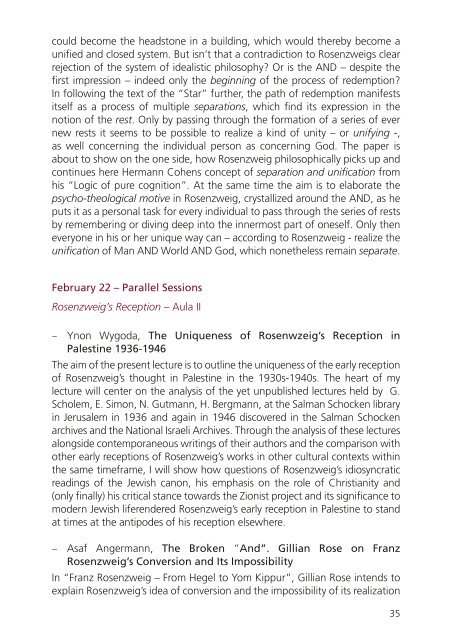Franz Rosenzweig
VZ2hG1
VZ2hG1
You also want an ePaper? Increase the reach of your titles
YUMPU automatically turns print PDFs into web optimized ePapers that Google loves.
could become the headstone in a building, which would thereby become a<br />
unified and closed system. But isn’t that a contradiction to <strong>Rosenzweig</strong>s clear<br />
rejection of the system of idealistic philosophy? Or is the AND – despite the<br />
first impression – indeed only the beginning of the process of redemption?<br />
In following the text of the “Star” further, the path of redemption manifests<br />
itself as a process of multiple separations, which find its expression in the<br />
notion of the rest. Only by passing through the formation of a series of ever<br />
new rests it seems to be possible to realize a kind of unity – or unifying -,<br />
as well concerning the individual person as concerning God. The paper is<br />
about to show on the one side, how <strong>Rosenzweig</strong> philosophically picks up and<br />
continues here Hermann Cohens concept of separation and unification from<br />
his “Logic of pure cognition”. At the same time the aim is to elaborate the<br />
psycho-theological motive in <strong>Rosenzweig</strong>, crystallized around the AND, as he<br />
puts it as a personal task for every individual to pass through the series of rests<br />
by remembering or diving deep into the innermost part of oneself. Only then<br />
everyone in his or her unique way can – according to <strong>Rosenzweig</strong> - realize the<br />
unification of Man AND World AND God, which nonetheless remain separate.<br />
February 22 – Parallel Sessions<br />
<strong>Rosenzweig</strong>’s Reception – Aula II<br />
– Ynon Wygoda, The Uniqueness of Rosenwzeig’s Reception in<br />
Palestine 1936-1946<br />
The aim of the present lecture is to outline the uniqueness of the early reception<br />
of <strong>Rosenzweig</strong>’s thought in Palestine in the 1930s-1940s. The heart of my<br />
lecture will center on the analysis of the yet unpublished lectures held by G.<br />
Scholem, E. Simon, N. Gutmann, H. Bergmann, at the Salman Schocken library<br />
in Jerusalem in 1936 and again in 1946 discovered in the Salman Schocken<br />
archives and the National Israeli Archives. Through the analysis of these lectures<br />
alongside contemporaneous writings of their authors and the comparison with<br />
other early receptions of <strong>Rosenzweig</strong>’s works in other cultural contexts within<br />
the same timeframe, I will show how questions of <strong>Rosenzweig</strong>’s idiosyncratic<br />
readings of the Jewish canon, his emphasis on the role of Christianity and<br />
(only finally) his critical stance towards the Zionist project and its significance to<br />
modern Jewish liferendered <strong>Rosenzweig</strong>’s early reception in Palestine to stand<br />
at times at the antipodes of his reception elsewhere.<br />
– Asaf Angermann, The Broken “And”. Gillian Rose on <strong>Franz</strong><br />
<strong>Rosenzweig</strong>’s Conversion and Its Impossibility<br />
In “<strong>Franz</strong> <strong>Rosenzweig</strong> – From Hegel to Yom Kippur”, Gillian Rose intends to<br />
explain <strong>Rosenzweig</strong>’s idea of conversion and the impossibility of its realization<br />
35


